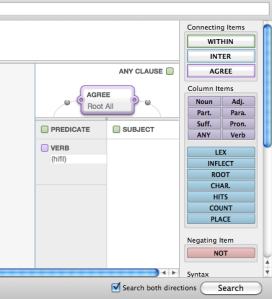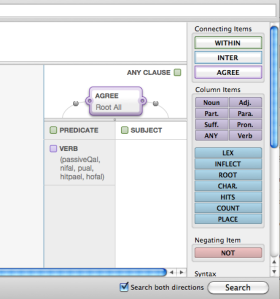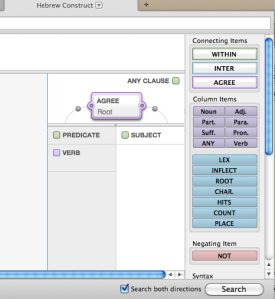Now that we have a list of cognate accusatives (two lists actually) we can begin to develop some measures to further analyze the construction. The analytics window in Accordance shows a variety of patterns.
For instance, in our group of complements you’ll notice 13 particles. Those are the instances where the verb עלה is governing a prepositional phrase headed by על. The group of adjuncts has some similar cases that should be omitted.
You will also see that the group of complements can be divided between nouns in the absolute state and those in the construct:

At this point I have maximized what I can do with Accordance, so we will need to start tallying things by hand.[1] My first intuition is that we should look at two things: what types of noun phrases are showing up as cognate accusatives and with what semantic classes of verbs. In this post we will look at the former, the latter in the next.
Based on the analytics, the most obvious division is between bare indefinite noun phrases and noun phrases that are qualified in some manner (adjective, pronominal suffix, or in a construct relation).[2] For our complement cognate accusatives, there are about 80 bare indefinites and 90 qualified nouns. For the adjunct cognate accusatives I count roughly 25 bare indefinites and 15 qualified nouns. Overall it seems to be split rather evenly.
It is often assumed that the cognate accusative construction is used for manner modification. Biblical Hebrew (a root-pattern language) does not have a large set of derivational morphemes; therefore, to an English speaker it may seem like Biblical Hebrew has a shortage of adjectives and adverbs (I believe one of the teaching grammars uses this label).[3] More properly, the language simply expresses such concepts differently. For instance:
וַיֶּחֱרַד יִצְחָק חֲרָדָה גְּדֹלָה
“Isaac trembled a great tremble” ≅ “Isaac trembled greatly” (Gen 27:33)
In many cases, however, the qualifier does not add any adverbial nuance. Consider the following pair of sentences:
וַיַּחֲלֹם יוֹסֵף חֲלוֹם
“Joseph dreamed a dream” (Gen 37:5)
וַיַּחֲלֹם עוֹד חֲלוֹם אַחֵר
“Joseph again dreamed another dream” (Gen 37:9)
Note how there is already an explicit adverbial—עוד—in the second verse. The adjective אחר seems to simply be an adjective here, specifying that it was a second dream.
Further, if manner modification is the function of cognate accusatives, what is the point of all those bare indefinites? It is often suggested that the bare indefinite cognate accusatives also have an “emphasizing” function. Thus:
שָׁם פָּחֲדוּ פָחַד
“There they shall be in great terror” (Ps 14:5 NRSV, emphasis mine)
In general, I find this highly suspect. Consider these counter-examples in Genesis:
וַיִּדַּר יַעֲקֹב נֶדֶר
“Jacob really (?) made a vow” (Gen 28:20)
וַיִּזְבַּח יַעֲקֹב זֶבַח
“Jacob really (?) made a sacrifice” (Gen 31:54)
וַיַּצֵּב יַעֲקֹב מַצֵּבָה
“Jacob really (?) erected a sacred stone” (Gen 35:14)
While cognate accusatives can leverage the relationship between verb and object in order to introduce manner modification, this does not seem to be a good explanation for the bulk of the examples. In the next post we will consider whether verbal semantics can help us.
_____________________________________
[1] In a perfect world, I would like to be able to dump the cognate accusatives from the previous search into a database and then tag each of them with several user defined parameters in order to cross-reference them, but Accordance is not that type of analytical tool. In a slightly less perfect world, I would like to run some sub-searches on the result set we produced with our previous search. Normally we could do this with the [CONTENTS ? ] command, but I realized there is a problem. CONTENTS returns a list of all verses that produced a hit, but the scope for a syntax search must be a chapter or book since it is possible for a syntactic unit to span two or more verses. We can use the analytics to get some broad analysis on the distribution.
[2] Conspicuously, the search returned no hits on nouns determined by the definite article. This seems to be a by-product of the way the [AGREE] command interacts with the syntax tags, namely it is not searching the entire complement phrase for roots that agree, but only the very first element in the phrase. For instance, the following verse did not produce a hit:
לִלְבֹּן הַלְּבֵנִים
“to ‘brick’ the bricks” (Exod 5:7)
Though it is syntactically analogous to this indefinite example:
נִלְבְּנָה לְבֵנִים
“Let’s ‘brick’ bricks” Gen 11:3
The grammars suggest that the typical “internal object” (look it up) is an indefinite cognate accusative. Were we doing a formal research project, we would obviously want to double check these definite examples to see if there is anything interesting going on.
[3] Of course, this line of thinking can lead to bad philosophical conclusions about differences between the Hebrew mind (i.e. they are concrete thinkers) and the Greek mind (capable of abstract thought). For instance, I recently had a man who had some seminary training (a while ago of course) try to argue with me that the “Hebrews” had no “concept of time”. I believe my face went into severe contortions and I began chanting the mantra James Barr… James Barr… James Barr…











